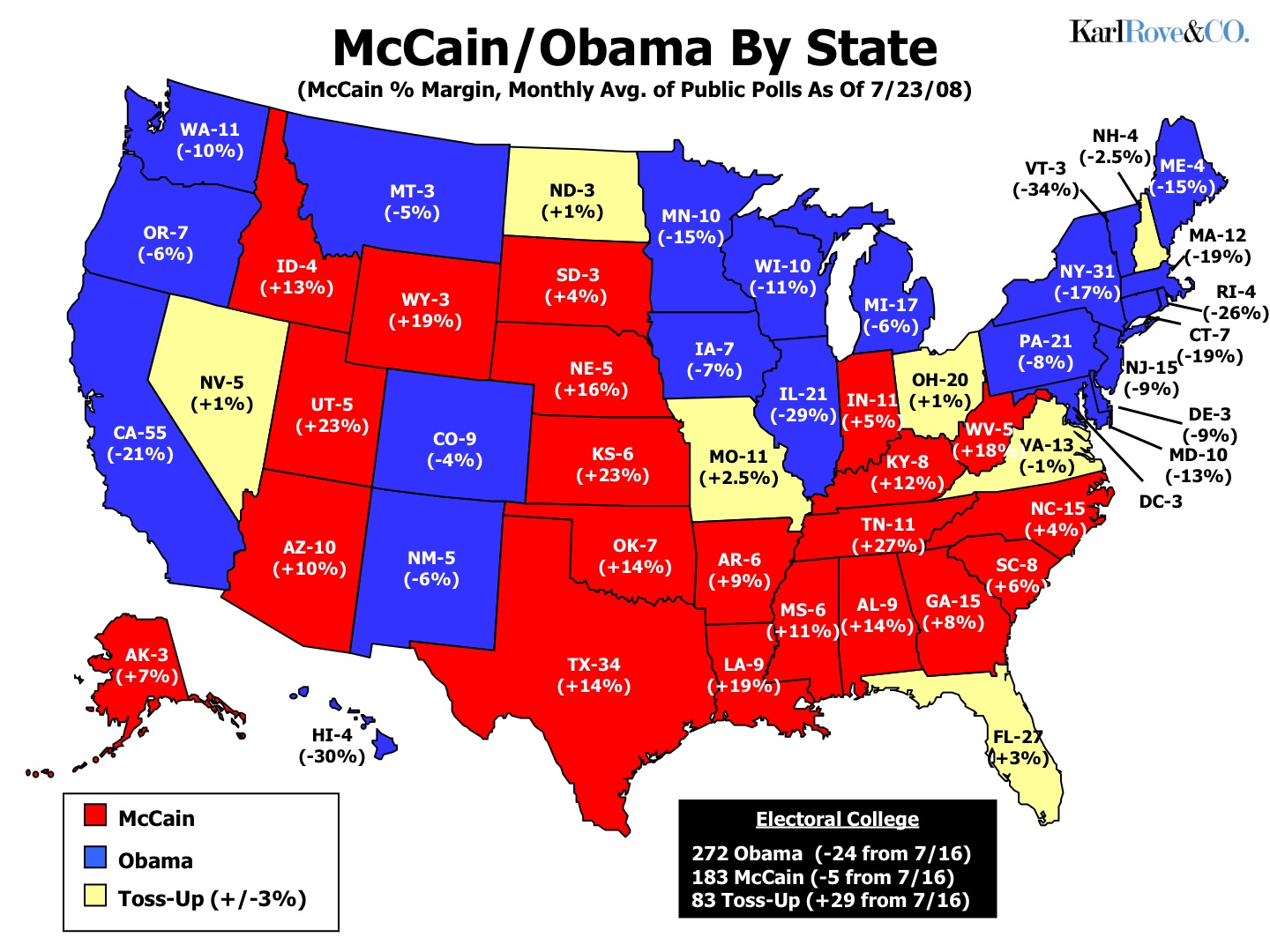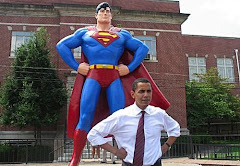Lady Cop: We're here for the DNC.
Toshi: But why are you all suited up in riot gear? What are you anticipating?
 Lady Cop: We're prepared for anything--most of the protesters plan to be peaceful, but some of them are not.
Lady Cop: We're prepared for anything--most of the protesters plan to be peaceful, but some of them are not.
Toshi: It's kind of scary to see you all dressed like this, with the big clubs & extrame riot gear...
Lady Cop: That's probably a good thing!
As we walked away, I felt uneasy--people who are not breaking the law and don't plan to break the law shouldn't have to feel afraid of the police.
Only people who are doing something violent or wrong should fear the consequences.
People whom the police are supposedly protecting (participants in the DNC) should feel reassured by their presence, but the "police state" feel in the air was disquieting when we arrived on Sunday and certainly it intensified on Monday.
The rest of the week, things seemed to quiet down, and there wasn't as much intense police presence. The protesters also seemed to tone it down, and there was less of a sense that direct confrontation (rather than simply free speech) was the main goal.

Of course the police were still out and about patrolling the streets, but it didn't feel like there were hundreds of riot cops within view at all times. And the constant wailing of sirens had waned to random moments punctuated by flashing lights on police vehicles.
These bicycle cops happily posed for pictures with several convention-goers, including yours truly. They were funny, relaxed, and friendly (this was Wednesday, after things seemed to have generally cooled down).

Ultimately, all of the interactions Toshi and I had with the police were positive, with them giving me information about where to eat, where to go, and general safety tips ("Don't have your convention credentials hanging around your neck where people can snatch them" or "Get out of the street, ma'am--you're about to get run over!").
One moment when I was particularly glad to have the strong police presence was when Toshi and I encountered these 2 protests: pro-gay and anti-gay demonstrations were underway right next to one another on the 16th street mall (pedestrian street lined with shops in Downtown Denver near the convention center). Things were tense to say the least. I was getting increasingly worried as the insults flew and the F-word was liberally applied by both sides.

I suggested we get out of there--and as we left, I was so relieved to see a big squad of police officers put themselves in between the two groups of angry protesters. They put their bodies in between the two groups, so that each one could express their points without hurting someone or getting hurt. I have great respect for these officers who used their own bodies as a shield for free speech.
It makes me reconsider the lyrics of this song by one of my favorite musical artists (Michael Franti/Spearhead).
"F*ck the police! We can keep the peace.
We can make love and conquer that disease.
Because nothing in the world is impossible to me--
I can swim on dry land or roll up on the sea.
Nothing in the world is impossible to me--
you can chop off my legs and I'll land upon my feet!"
But can we keep the peace? Or do we need some help? Maybe we get by with a little help from our friends?? can the police be our friends? can "they" be part of "we"?
Our hostess Brit (a street medic) told me she was impressed with the police and the worst injuries they treated were sunscreen in the eyes and a bandaid for a cut in a Food Not Bombs kitchen. Brit said she was walking home w/2 other medics, decked out in red crosses, at 3am on night. Public transportation had shut down for the night. A police car pulled up and offered them a ride, saying "We're both neutral observers here."
When I was a kid, I used to love tagging the following graffiti:


BUT
I wrote this all over the place without considering the practical implications and without truly considering he meaning of either anarchy or peace.
Now I wonder if "anarchy but peace" is even possible?
or even desirable? (sorry black blockers!)
Or if it just something that people scrawl on bathroom walls to make ourselves feel better, to feel like we're doing something, to get a surge of powerful feelings like we are "sticking it to the man." but who is "the man" anyway? and is there a better way to change our world?
I guess I have become more critical and more of a realist since I was 13 (I sure hope so!). As I grow older, I realize how important it is for people to have limits and the necessity to have individuals and groups within society (and families) who enforce the limits for the sake of basic safety, sanitation, and respect.

People feel safer and behave better with limits: social science and lived experience bear out this conclusion. We need to know what the limits are, or we will constantly be testing them, and this constant testing without discovery of any boundaries leads people to a state of angst, anxiety, and even anger. Children and adults alike yearn to know what is OK and not OK, and we look to someone who is stronger, smarter, and safer than ourselves to show us the way.
but are the police the right people for the job? Should they be the boundary-enforcers of first resort or only used as our last resort when all else fails?
social workers are often considered a kind of social police, and I have often felt uncomfortable wih the social control aspect of my field, preferring the social justice angle.

Especially as a new and young social worker, I often find myself wondering, "Who am I to be enforcing these social norms anyway?"
Martin Luther King was often challenged by supporters and skeptics alike about his commitment to legal reforms to protect and ensure civil rights for all people. Critics said that education, not laws, were needed to truly reform people's hearts and minds. MLK agreed to a certain extent, stating that laws and education were both necessary components of the recipe to heal the racial divides in our nation. Then he stated that "the law can't make a man love me- but it can
keep a man from lynching me! and I think that's pretty important too." So laws and law enforcement have an important role to play in social justice, social harmony, and the regulation of social behavior.
I don't have the answer to all this, but again I have a lot of important questions to ponder about how we can create the society we want with carefully chosen and humanely enforced limits to maintain basic safety and security for community members.

It seems to me that we do need help keeping the peace, and it is a generally good thing to have people trained to prevent problems and injuries when people are exercising their right to free speech. but of course power can breed corruption and abuse, so it is essential that police forces (especially those outfitted with powerful automatic weapons, lethal and non-lethal strategies for stopping protesters in their tracks, tear gas, and massive nightsticks) be held accountable for their actions.
This guy might disagree:
It was interesting to me to see the reaction of some of the protesters to the police presence--having personally talked to people in Bosnia, the USSR, and Nazi Germay, I don't think Denver during the DNC is anything close to what a "police state looks like" ...
The police were generally helpful and friendly unless you were doing something dangerous or pushing against the boundaries that were set up to preserve the safety of the delegates and convention attendees. With plans such as the one that DASW (Direct Action to Stop War) explained to me--trapping the delegates in wire cages as they tried to enter the convention floor for example--I think it would have been worse if these protesters were allowed to exercise their so-called "right to free speech" by usurping others' rights to move about freely. If a "police state" means stopping people from committing the crimes of assault, battery, and kidnapping against participants in the democratic process, sign me up.
Free speech is a right that does have some limits, like the way my father describes the right to smoke cigarettes:
"You're right to smoke a cigarette ends where my nose begins!"

Today I was having coffee and blogging at an internet cafe and I saw someone who looked very familiar, so I asked if he was from Berkeley--he WAS! And he came here to assist Denver's CopWatch program, which holds the police accountable for their actions by documenting what is happening, and attempts to prevent police brutality and abuses of power by being present and letting the police know that someone is watching their activities and reporting on what they are doing.
I had a great conversation with the CopWatch rep from Berkeley, as well as a local CopWatcher from Denver (video coming soon--it's a long one so it takes a while to upload; check back soon!).
They graded the cops' behavior this week as follows:
 Sunday: BMonday: F
Sunday: BMonday: F
(Rage Against the Machine Concert)Tuesday: CWednesday: B+
(Iraq War Veterans March)Thursday: B










































